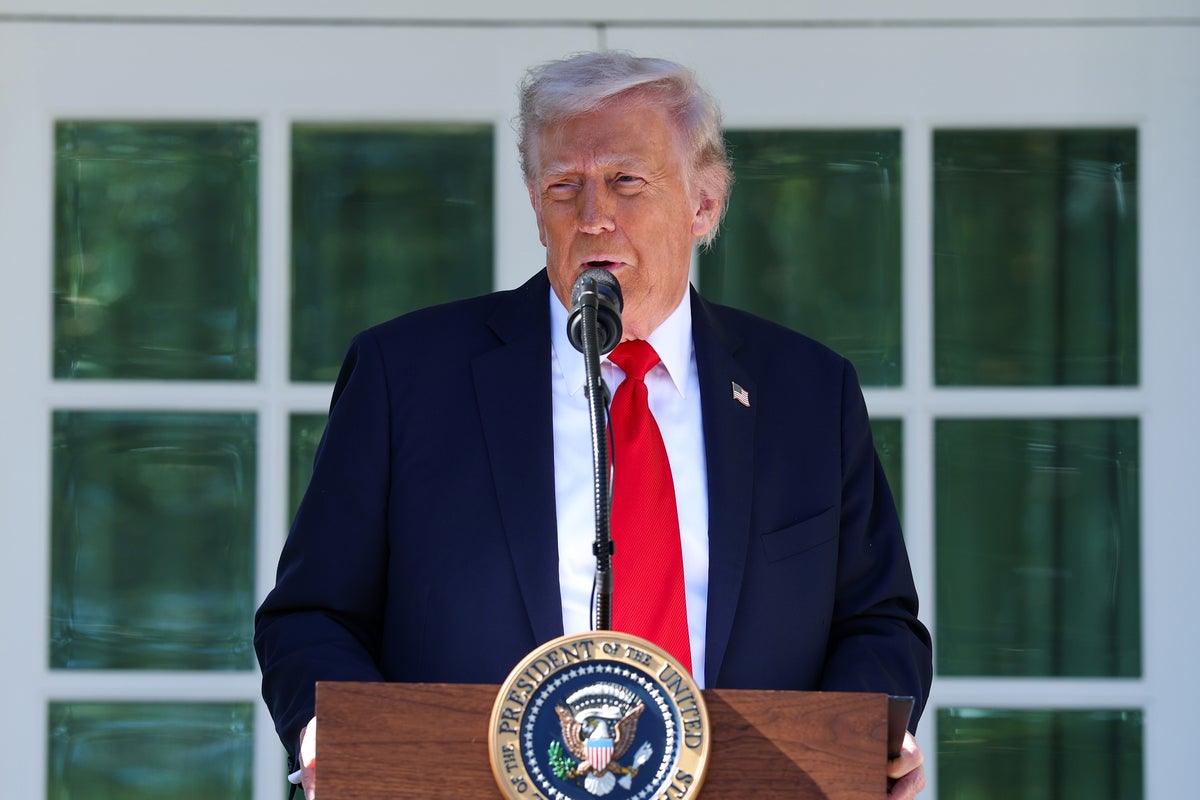A version of the below article first appeared in David Corn’s newsletter, Our Land. The newsletter comes out twice a week (most of the time) and provides behind-the-scenes stories and articles about politics, media, and culture. Subscribing costs just $5 a month—but you can sign up for a free 30-day trial.
It’s hard to define Trumpism without Donald Trump. So much of what Trump does arises from demagogic political self-interest, not ideology or well-formed policy.
He assaults elites and decries politicians for having screwed over middle America, while gold-plating the White House, grifting his way to billions, and pushing legislation that tosses big tax cuts to the well-heeled and raises the cost of health insurance for millions. He proclaims that politicians have betrayed the citizenry, but he guts safeguards that protect consumers, workers, investors, and retirees, allowing powerful corporations to run wild. He boasts he’s pursuing an America First policy, yet he’s spending up to $40 billion to bail out his pal in Argentina. Trumpism, as practiced and presented by Trump, is a hodgepodge—a mélange of impulses, insults, contradictions, and half-baked ideas, far from a coherent set of principles.
He signed an amicus brief that contended LGBTQ people were not protected by workplace discrimination bans. He filed lawsuits to kill the Affordable Care Act. He sued the Biden administration, alleging it was censoring anti-vaccine activism. He’s full MAGA.
But there are others who do a better job than Trump of shaping Trumpism into a coherent ideology that melds nativism and oligarchism. And they present as much danger—possibly more?—to American society as the undisciplined, erratic wannabe-autocrat who leads the MAGA cult. One of these Trumpers is Eric Schmitt.
Never heard of him? He’s the junior US senator from Missouri, a Republican, naturally. He was elected in the 2022 election. Prior to that he was the Show Me State’s attorney general. In that position, he championed Trump’s Big Lie about the 2020 election and supported failed lawsuits that tried to overturn the election results. He signed an amicus brief that contended LGBTQ people were not protected by workplace discrimination bans. He filed lawsuits to kill the Affordable Care Act. He sued the Biden administration, alleging it was censoring anti-vaccine activism. He’s full MAGA.
In the Senate, he has not yet become a national figure. But it’s clear this 50-year-old career politician has supersize ambitions. He demonstrated his ability to be a post-Trump leader of Trumpism with a speech he gave in September at the National Conservative Conference held in Washington, DC. It’s worth considering it in detail.
Proclaiming himself a champion of “national conservatism,” Schmitt defined this ideology as a “revolt,” within a “culture war,” against “the elites who rule everywhere but are not truly from anywhere.” Before explaining precisely what he meant by that, he assailed traditional (pre-Trump) conservatism for having gone along with the “Washington consensus” of foreign interventions, free trade, and pro-immigration policies that “undercut American wages, replace American workers, and transfer entire industries into the hands of foreign lobbies.”
This is standard fare for Trump acolytes who have tried to bend conservatism to fit into Trump’s mold. But Schmitt devoted much of his speech to the question of who is a true American. He derided those on the right and the left who have depicted America as an “idea,” noting:
For decades, the mainstream consensus on the left and the right alike seemed to be that America itself was just an “idea”—a vehicle for global liberalism. We were told that the entire meaning of America boiled down to a few lines in a poem on the Statue of Liberty, and five words about equality in the Declaration of Independence. Any other aspect of American identity was deemed to be illegitimate and immoral, poisoned by the evils of our ancestors. The true meaning of America, they said, was liberalism, multiculturalism, and endless immigration. In a speech in 1998, Bill Clinton said that the continuous influx of immigrants was—and I quote—a “reminder that our America is not so much a place as a promise.”
Real Americans, he asserted, have been betrayed: “Their true adversary did not live in the faraway sands of some foreign nation, but in the halls of their own government.”
Not really, Schmitt insisted. The foundational principles are critical to the nation, he said, but America was not “a universal proposition” available to just anyone. He told his audience, “That’s what set Donald Trump apart from the old conservatism and the old liberalism alike: He knows that America is not just an abstract ‘proposition,’ but a nation and a people, with its own distinct history and heritage and interests.” You see where he’s heading with this?
Real Americans, he asserted, have been betrayed: “Their true adversary did not live in the faraway sands of some foreign nation, but in the halls of their own government.” These Americans were heirs to a particular history:
The Continental Army soldiers dying of frostbite at Valley Forge, the Pilgrims struggling to survive in the hard winter soil of Plymouth, the pioneers striking out from Missouri for the wild and dangerous frontier, the outnumbered Kentucky settlers repelling wave after wave of Indian war band attacks from behind their stockade walls—all of them would be astonished to hear that they were only fighting for a “proposition.”
They believed they were forging a nation—a homeland for themselves and their descendants. They fought, they bled, they struggled, they died for us. They built this country for us.
The key word here is “descendants.” Schmitt was suggesting America belongs more to some than others. (In Animal Farm, the fascist regime declares, “Some animals are more equal than others.”) America, the senator said, is not a “universal nation” open to anyone who wishes to join.
After referring to the United States as “the most essentially Western nation,” he hammered this point: “We Americans are the sons and daughters of the Christian pilgrims that poured out from Europe’s shores to baptize a new world in their ancient faith. Our ancestors were driven here by destiny, possessed by urgent and fiery conviction, by burning belief, devoted to their cause and their God.” He celebrated the waves of European settlers in the 1800s, noting his own ancestors arrived in Missouri from Germany in the 1840s, and that it was the brave Christian souls who headed West “to build a home at the edge of the known world” who made America and—most important—bequeathed it to future Americans.
“We’re not sorry,” Schmitt said. “Why would we be sorry? America is the proudest and most magnificent heritage ever known to man.”
Schmitt denounced those who would dare take notice of the genocide of Indigenous people or other ills of America’s past:
For some time now, we’ve been taught to be ashamed of these things that defined us—to treat our curiosity, adventurousness, and ambition as a stain on our moral conscience. We’ve been taught that, by settling this continent and building our home here, we committed a world-historical sin, and that we should rue the day that our forefathers arrived in North America, and condemn their vision, their strength, and their will as an expression of something perverse and evil.
He added: “The American heritage is not a narrative of oppression and evil, but the unfolding story of our people’s pioneer spirit—a spirit that drives us to expand beyond limits, to assert ourselves upon the world…We’re not sorry. Why would we be sorry? America is the proudest and most magnificent heritage ever known to man.”
As for those who would raise questions about America’s glorious past—including those Americans who joined protests after George Floyd’s murder in 2020—Schmitt said, “America does not belong to them. It belongs to us. It’s our home. It’s a heritage entrusted to us by our ancestors. It is a way of life that is ours, and only ours, and if we disappear, then America, too, will cease to exist.” Who is the “we” in that declaration? The descendants of the European Christians who claimed the West.
The fight at hand, Schmitt contended, “is about whether our children will still have a country to call their own. It’s about whether America will remain what she was meant to be: the apex and the vanguard of Western civilization.”
Schmitt’s speech was an articulate and sophisticated embrace of blood and soil. His message was that America is a land not for those who have come here drawn by its ideals and promises but for those whose ancestors were on the wagon trains and who conquered the frontier. American greatness is derived from the legacy of those people, not whatever values and principles a diverse and pluralistic society shares and honors. (“If you imposed a carbon copy of the US Constitution on Kazakhstan tomorrow,” he said, “Kazakhstan wouldn’t magically become America. Because Kazakhstan isn’t filled with Americans. It’s filled with Kazakhstanis!”)
In his celebration of American history, Schmitt fixates on a particular set of ancestors who helped form this nation. His story does not include the contributions of enslaved people whose free labor generated much of its wealth, or the Chinese workers who laid the tracks for railroads that transformed the country, or the Mexican workers whose toil and sweat turned California into an agricultural powerhouse. Nor does his narrative include immigrants who arrived later from non-European countries. He is focused on—shall we say it?—white people.
Schmitt aptly combines explicit nativism, implied white supremacy, purported economic populism, and anti-elitism into a neat package, and he’s a damn good salesman for this noxious brew.
Schmitt deftly ties his skewed history lesson to the grievances held by white voters of today, arguing that those who don’t accept this particular view of American greatness are the same folks responsible for the economic policies and decisions that have hollowed out middle America and left many Main Streets in tatters. He is integrating racial and economic resentments, with a dash of Christian nationalism, into a coherent and divisive strategy for prosecuting the culture war against them: unidentified elites, critics of American society, and…well, fill in the blanks.
All of this is present in the Trumpism espoused by Dear Leader. But Schmitt more aptly combines explicit nativism, implied white supremacy, purported economic populism, and anti-elitism into a neat package, and he’s a damn good salesman for this noxious brew.
He’s a crafty and disingenuous fellow who’s skilled at performative politics. Two weeks after this speech and six days after the assassination of Charlie Kirk, at a Senate Judiciary Committee hearing where FBI Director Kash Patel was the witness, Schmitt used the occasion to describe America as in the grips of a titanic battle between good and evil, with the latter being a left that encourages political violence. He cited instances of violence committed by people with left-leaning agendas, but absent from his list were shootings and massacres perpetrated by those motivated by conservative beliefs, such as the killing of Democrats in Minnesota by a Trump supporter. He also ignored January 6, the largest act of insurrectionist violence since the Civil War.
Don’t give me this both-sides bullshit,” Schmitt angrily exclaimed. He claimed that political violence in the United States is happening on a “mass scale” and is “not organic.” It is part of a nefarious and orchestrated plot, he insisted,
the offspring of a dark clandestine system funded in part with our own tax dollars with a large network of foundations, NGOs, activist organizations, and front groups. This system lurks behind every radical leftist movement in our nation today. The George Soros empire has financed a vast ecosystem of radicals, all working together, dropping off bricks at riots, to unleash a tidal wave of violent anarchists on our streets and to prop it up in an army of researchers, experts, and journalists, and propagandists who downplay the political violence.
Schmitt’s fact-twisting—the claim that Soros’ organization supplies bricks to violent protesters has been debunked repeatedly but remains a right-wing article of faith—and his amnesia about January 6 and other horrific violence from the right show that he is yet just another MAGA fabulist willing to lie and misrepresent to exploit hate, paranoia, and distrust to score political points. Like you-know-who. But he is much better able than Trump to convey the ideology that animates Trump’s own political movement and that is the foundation for Trump’s march toward authoritarianism. That’s quite a talent, and Schmitt intends to put it to good use—that is, good for himself.














